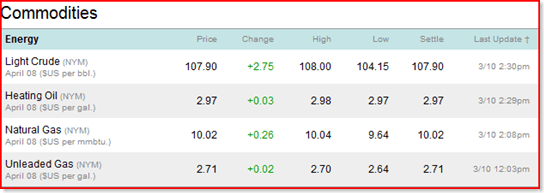The picture above shows the price of light crude as of 10 March 2008, 2.30PM settling at USD107.90. It is no secret that the onset of a recession in the US economy which is occurring against the volatility of oil prices in the world market should be of great concern to the Barbados government and Barbadians in general. Why should we be concern? Barbados is an economy which is ultra-dependent on the tourist dollar to support our economy. The increasing price of oil will have the affect of increasing the cost of air transportation to Barbados, along with the looming recession in the USA which will dampen travel by Americans abroad; Barbados maybe in for a rough ride.
Thomas Boone Pickens, Jr is the 117th richest man in the USA and the 369th in the world. He has made his fortune as a Texan oilman. His business acumen as an entrepreneur who is able to sniff out companies ripe for acquisition has become legendary. His background in the oil industry makes him an expert, therefore when he gives his opinion on the oil business, the world sits up with ears pricked. Recently in a CNN interview T.B Pickens predicted that the price of oil will fall below USD100.00 in quarter two but his best judgement projects that the price of oil will shoot to USD200.00 later in the year.He is so confident that oil prices will increase and make it an unrealistic raw material as a source of primary energy that Texas of all places has started to invest significantly in Wind Power Energy.
Just a month ago BU published an article which highlighted the issues preventing Barbados from pursuing wind, solar and geo-thermal as alternative sources of energy. We are grateful to Chief Marketing Officer Stephen Worme for his willingness to respond to Barbados Underground on this important issue. We are on record as complimenting the Barbados Light & Power (BL&P) as a well managed company. We however strongly disagree that BL&P should be leading the thrust to develop alternative sources of energy. It definitely does not suit the current business model of BL&P that this would be a strategic objective of great priority. It is no secret that the government of Barbados continues to subsidize the price of oil at the ridiculously low level of USD65.00 which is a continuation of the policy of the former government. With the world oil price continuing to increase the time will soon come when the government will have to address the issue of the oil subsidy.
One of the issues which resonated with the Barbados public during the just held general election was the high cost of living. Again it is no secret that a significant amount of taxpayers money is spent by Barbados to fund its energy bill. If oil continues to skyrocket it does not take an Economist to figure what will happen. If Texan Oil Billionaire is correct in his prediction, then Prime Minister David Thompson is about to get a migraine headache. We applaud his effort to buffer the impact of the rising oil prices on the cost of living but if the price of oil continues on current trend and the US recession kicks in, there is very little the government will be able to do to shield Barbados from the shock it will cause. It is as simple as that and there is not one damn thing Prime Minister Thompson can do about it.
We conclude this blog by restating an earlier position. The small and open nature of our tiny economy makes it a top priority for Barbados to rationalize and unfold a serious national energy policy. Whether it is to be wind, solar or both we don’t care but we need to stop talking and start implementing. The petty arguments need to stop and bold decisions taken to shape the energy policy of Barbados. Our current standard of living rests on it and equally the rich legacy of good governance practiced by Barbados looms under threat.
Prime Minister David Thompson promised Barbadians in January that he would be their Knight in shinning armour by rolling-out policies to curb the runaway cost of living. How can he do that with oil price projected to reach USD200.00 by end of year? Will this be another empty promise similar to his promise to stop the Neal & Massy/BS&T merger?





Leave a Reply to Green MonkeyCancel reply